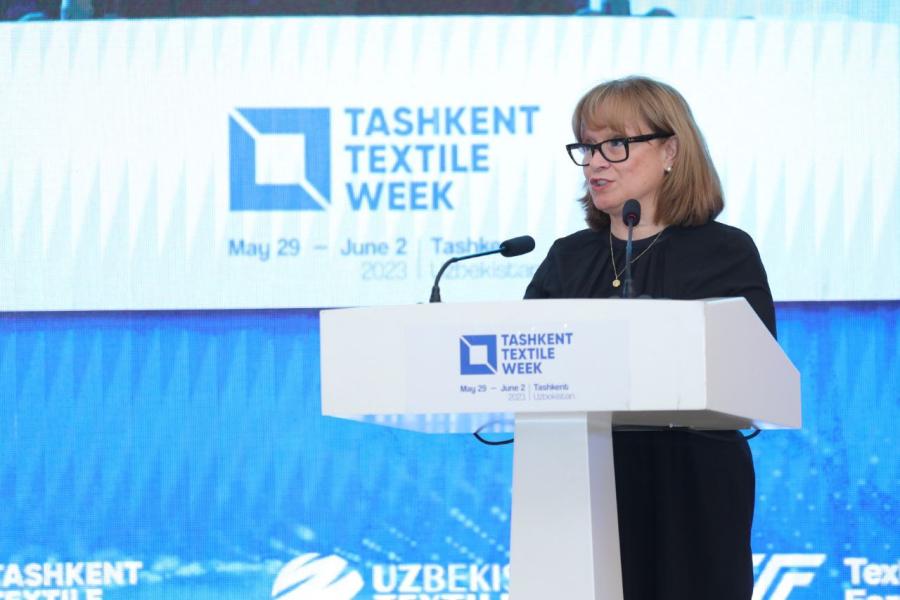Speech of Consuelo Vidal, UN Resident Coordinator in Uzbekistan at the Tashkent Textile Forum 2023
Excellencies, distinguished guests, ladies, and gentlemen.
It is a great honor for me to stand before you today as the United Nations Resident Coordinator for Uzbekistan, representing the shared vision of our global community for a better and more sustainable world. I am here to celebrate with you the power of social entrepreneurship and its profound connection to the Sustainable Development Goals (SDGs).

I want to express my gratitude to Madam Тanzila Narbaeva, Chairwoman of Senate of Oliy Majlis of Uzbekistan, for her staunch support to sustainable development. I would also like to acknowledge the presence of His Excellency Jamshid Khodjaev, Deputy Prime Minister of Uzbekistan; and Ms. Olga Kulaeva, Director of the ILO Office for Eastern Europe and Central Asia; and Dr. Christian Schindler, General Director of ITMF.
The textile industry has long been a significant driver of economic growth and employment opportunities, not only in Uzbekistan but around the world. However, we must acknowledge that it is not without its challenges. Issues such as environmental sustainability, fair labor practices, and inclusive economic development have become increasingly critical in the global context.
Uzbekistan, with its rich textile heritage and vibrant entrepreneurial spirit, is a prime example of how the industry can be an agent for sustainable development. By leveraging the power of this industry, we have the opportunity to make significant strides towards achieving the Sustainable Development Goals (SDGs) which call for action on a wide range of interconnected issues, including eradicating poverty, promoting gender equality, ensuring decent work and economic growth, and protecting the environment. The textile industry intersects with many of these goals, making it a crucial sector for our collective efforts.
First and foremost, the private sector textile companies play a vital role in advancing Goal 8: Decent Work and Economic Growth. By embracing sustainable business practices, these companies can provide fair and safe working conditions for their employees, promote gender equality and diversity, and contribute to inclusive economic growth. By investing in skills development and capacity building, they can empower their workforce and foster sustainable livelihoods.
Furthermore, textile companies have the potential to drive progress towards Goal 12: Responsible Consumption and Production. Through innovation and resource efficiency, waste can be reduced, the environmental footprint of their operations minimized, and the responsible use of chemicals and materials ensured. By embracing circular economy principles, and promoting sustainable fashion choices, the industry can be transformed into a model of sustainable production and consumption.
The textile industry also has a direct impact on Goal 5: Gender Equality. By promoting women's empowerment and creating equal opportunities for women in the workplace, textile companies can contribute to a more inclusive and just society. They can support women-owned businesses, ensure equal pay for equal work, and eliminate discrimination and harassment.
Moreover, textile companies have a responsibility to address Goal 13: Climate Action. By adopting clean and renewable energy sources, reducing greenhouse gas emissions, and integrating climate considerations into their supply chains, they can contribute to the global effort to combat climate change. By embracing sustainable sourcing practices and supporting regenerative agriculture, they can contribute to biodiversity conservation and land restoration, aligning with Goal 15: Life on Land.
Ladies and gentlemen, the textile industry here in Uzbekistan and across the world holds tremendous potential to make a positive impact on the SDGs. However, it requires collective action, collaboration, and a shared commitment to sustainable practices. Governments, international organizations, civil society, and the private sector can work together to create an enabling environment for sustainable textile production and consumption.
I am encouraged by the dedication and engagement demonstrated by the participants in the Textile Forum 2023. Your presence here today underscores your commitment to advancing the SDGs through sustainable textile practices. I urge you to leverage the outcomes of this Forum to inform policies, mobilize resources, and implement concrete actions that will drive sustainable change in the textile industry.
As the United Nations, we stand ready to support your efforts and provide a platform for knowledge sharing and collaboration. Together, we can harness the power of the private sector to deliver the SDGs and create a more equitable, inclusive, and sustainable future for all.
Thank you.




